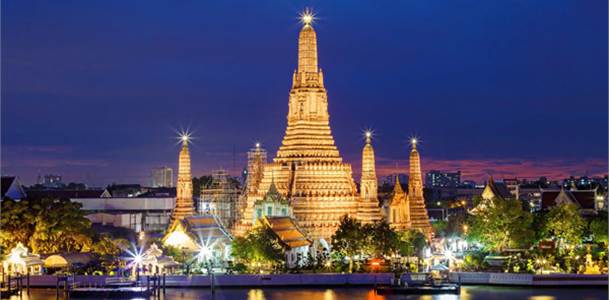Property agent Kyaw Saw leafs through a thick pile of real-estate listings in Myanmar’s faded commercial capital, Yangon.
“Our customers used to be all people from the east — from China, Taiwan and Japan,” said the portly businessman.
That’s changing fast.
“We had no Westerners a year ago. Get in now before the rush begins,” said Kyaw Saw, adding his former boss was now his competitor, having just left to start his own agency.
If you pay two years up front, Kyaw Saw promises to lock in further price rises at only 10 percent a year. He’s keen to tap a sudden wave of foreign interest in a crumbling city that until recently was a Southeast Asian backwater.
The capital of a former British colony ruled for five decades by a reclusive junta has faded under economic mismanagement and sanctions imposed by Western governments because of the military regime’s human rights record and refusal to embrace democracy.
Now ministers from those same governments are beating a path to the door of President Thein Sein, a retired junta general who, since coming to office as a civilian leader 10 months ago, has embarked on political and economic reform with a speed that has astonished even seasoned observers.
Residents say a groundbreaking visit by U.S. Secretary of State Hillary Clinton at the end of last year, followed by British Foreign Secretary William Hague this month, gave another nudge-up to property prices.
“Sanctions will go soon and that will be very good for business,” Kyaw Saw said.
INVESTMENT INTEREST
Businessmen are quietly flooding in, too, sensing that the country — with its oil, gas, timber and gems and a population untouched by the consumer boom seen elsewhere in Asia — could be the next big investment story once sanctions are removed or softened, which may be soon.
As a result, Yangon, which ceased to be the capital after the junta suddenly relocated to remote Naypyitaw in 2005, is in the midst of a property boom, felt especially keenly at the top end of what little proper office space there is, and for the type of housing Western executives expect in large Asian cities.
“The prices here are outrageous,” said an American businessman sitting in the lobby of a posh Yangon hotel, one of only a handful in the city, most of which have been fully booked over recent months.
The man, who lives in Bangkok and gave his name only as James, gives a resigned sigh when asked how his search for a home in Myanmar was going.
“This place is just exploding with investor interest.”
James visited a year ago to “scope out opportunities” and accommodation, but villas that were available for rent then at a few thousand dollars a year now cost up to $50,000.
“And you don’t get much for what you’re paying. There is very little choice,” James added, before heading off to meet a lawyer to hammer out details for a deal.
Those looking for offices to rent are not having much luck either. There’s not much available, and prices have soared.
Rental space in Yangon’s Sakura Tower, one of only two international standard office blocks in the downtown financial and former government district, have doubled in the space of a year to $50 a square metre from $25, and the smallest office, little more than a pokey room, now costs $3,000 a month.
Rents could go up another 30 percent before the end of the first half, said one sales executive, noting an occupancy rate of 99 percent compared with 75 percent this time last year.
“There is a lot of demand for office space but supply is very limited for space like ours,” she said, asking not to be identified, something that has become the norm in Myanmar after years of strict army control and fear.
“We are seeing more and more inquiries as the country’s situation changes, more and more investors,” she added. “Companies want to open an office first to do market research before the sanctions are lifted.”
SHORTAGES
It is a similar picture at the Centrepoint Towers just down the road, overlooking the golden dome of the Sule Pagoda, one of the city’s main Buddhist temples.
Office space that was only $13 per square metre a year ago is now $30 and up, depending on the floor, and will probably rise by another $10 in April or May, a sales executive said.
The government keeps no official data on property prices.
Foreigners are not allowed to own property although they can rent offices and houses from Myanmar citizens. In some cases, they are able to sign for long-term leasehold-type purchases as long as they have a local partner.
Authorities are working on amending a Foreign Investment Law and are studying regulations in other countries, officials said. In Thailand, for example, foreigners cannot own land. They can buy condominium units outright as long as the building has majority Thai ownership.
“The government has clearly stated they will not allow foreigners to own land,” said a real estate executive who gave his name as Myo, adding it could take several years for laws to be passed to allow the ownership of apartments.
Still, the properties on his books, mostly houses in leafy suburbs, were now going for $1,000-$1,500 per square metre, up from about $500 last year.
Property sales are often in the kyat currency, which has multiple and fluctuating exchange rates, including an official rate of about 6 kyat to the dollar that barely anyone uses. On the black market, it traded at about 820 to the dollar last Friday.
One house Myo sold recently by Inya Lake, on whose shores lives pro-democracy leader Aung San Suu Kyi, went for 850 million kyat (about $1 million), up by 150 million kyat from last year.
“We think things will continue to go up though not quite as fast,” he said.
Another realtor, who asked to be identified as Mr La, said prices had begun to become more rational after it dawned on people after Clinton’s visit that sanctions would not be lifted immediately.
“It all depends on the sanctions. This is the main thing,” he told Reuters, before describing how he had large villas to rent for the eye-watering price of $25,000 a month.
The properties that are available are often far from salubrious. Pictures in estate agents’ windows show dilapidated buildings optimistically termed “condominiums”, rarely more than a few storeys high and with the main selling points being either air conditioning or elevators.
An office in a building like this will cost about $900 a month, paid a year up front in brand new, flawless $100 bills, the only kind accepted in Myanmar’s cash-only economy.
Internet access needs to be separately arranged. It could take weeks to install, and even then probably runs at a crawl.
Singapore businessman Brian Jee has lived in Yangon for more than a decade, defying power cuts and the effects of sanctions to build an entertainment firm. But skyrocketing rents have forced him to take the unorthodox step of working from the gym.
“It’s a bargain at 70,000 kyat a month,” he said, in the midst of swapping rent horror stories with a friend in a Yangon cafe, referring to a figure equal to $85. “I get gym membership and free Internet access. I can work at the treadmill.”
“Otherwise you’re looking at $15,000 a month for top-of-the-line office space,” Jee added, sucking back on a cigarette.
“You could get something cheaper, but then you’ll have to wait weeks for them to put in a landline and internet.”
MANDALAY MADNESS
Only one thing is more outrageous to people in Yangon than the soaring prices there — the even more outrageous rises in Myanmar’s old royal capital of Mandalay and nearby towns like Lashio, both of which are dominated by ethnic Chinese traders, from both Myanmar and China.
While Yangon’s prices have only really been rising in the past year to 18 months, Mandalay and Lashio have seen huge increases in the last five years, driven by Chinese money and, some say, speculation by high-ranking members of the military.
Soe Win, an ethnic Chinese businessman in Lashio, said his neighbour bought a small house for 300 million kyat a few years ago. Last year a Yangon-based bank bought it for 700 million kyat. They knocked it down and will build two in its place to sell for a total of 1 billion kyat.
“I’m holding on to my land. Prices could rise even higher,” he said over a dinner of noodles and cow offal.
Money from China is able to flow into property and skirt the foreign ownership ban as many mainland Chinese either obtain Myanmar identity cards via bribery, marriage to a Myanmar national or through middlemen who are ethnic Chinese Myanmar citizens, businessmen say.
In Mandalay, one acre of land can cost up to $3 million, compared with $100,000 in Yangon, said businessman Aung Zaw Win.
“How can you do business in a situation like this? How are new investors supposed to come in?” he said.
POTHOLES AND FERAL DOGS
Even Yangon’s best office buildings, like the Sakura Tower, offer little in the way of amenities considered de rigueur in other Asian cities such as Singapore, Kuala Lumpur or Shanghai.
Parking spaces are close to non-existent, or hidden in dank alleys and pavements out front are potholed and sometimes little more than open drains.
But new office buildings are being thrown up around town, even if their wobbly looking
brickwork and rickety bamboo scaffolding belie English names such as “The Prosper Centre”.
A few Asian builders are at work: Singapore-listed property firm Yoma Strategic Holdings Ltd (YOMA.SI) says an emerging middle class is buying its homes as quickly as it can build them and its shares have quadrupled in the past three months.
Some properties have started going up where once stood buildings from Yangon’s colonial days, when the city was known as Rangoon. Not many people seem upset they are disappearing.
“I have contractors knocking at the door all the time,” said Min Lwin, whose art gallery, one of a handful in the city, sits in a lovingly protected colonial-era villa.
“It doesn’t make financial sense for many people to live in these old buildings when they can make a lot more money selling up for a new high-rise,” added the U.S.-educated art lover.
Myanmar people, many of whom get by on just a few dollars a day in what is one of the world’s poorest countries, are starting to worry about the rent, too.
“I only make $150 a month. What am I supposed to do if my rent keeps going up?” complained cosmetics trader Maung Thein, who runs a small stall in a Yangon market.
Taking a longer view, some reckon they could be sitting on a goldmine, as long as they can keep up with the rising rents.
Malaysian-born Verity Oo runs a coffee shop in what could one day be a very trendy part of central Yangon.
“Who knows? In two years this could be the location of Yangon’s first Starbucks,” she said. “I think it’s very possible. Myanmar is changing so fast.”
Source: http://www.reuters.com/article/2012/01/30/uk-myanmar-property-idUSLNE80T00Y20120130

